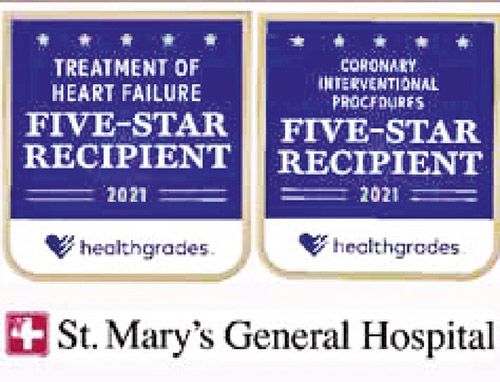
(Courtesy of SMGH) “Sometimes codes related to cardiac tests can be confusing,” said George Matyjewicz, PhD, community liaison at St. Mary’s General Hospital. “But they are all extremely important tests to diagnose heart conditions early to save your life. I know because my wife, Phyllis, was fortunate to be at St. Mary’s General when we learned the results of one test, and she had open heart bypass surgery the next day with Dr. Vinay (Avi) Tak.1 B”H, she is doing very well today.”2
St. Mary’s General Hospital, together with Saint Clare’s Health in Denville and Dover and Saint Michael’s Medical Center in Newark make up Prime Healthcare’s New Jersey region. Together they offer the full range of cardiac tests. We asked some of our physicians to tell us more.
“At Prime Healthcare, we offer a broad range of cardiovascular screening, testing and imaging tools, and conduct frequent outreach activities to help educate community members about cardiac health, risk factors and prevention of cardiovascular issues,” said Paul D. DeRenzi, MD, medical director of Saint Clare’s Health cardiac catheterization service in Denville.
“We have strong cardiac programs that have been in place for decades and a long track record of high-quality cardiac care,” said Daniel P. Conroy, MD, chief medical officer at St. Mary’s General Hospital. “Prime Healthcare’s New Jersey hospitals have a lot of cardiac-related expertise and technology here, and patients are in great hands.”
DeRenzi and Conroy recently discussed the range of key noninvasive cardiac tests available and how those assessments can help detect the presence of heart disease and irregularities:
Electrocardiography (EKG)—An EKG provides a visual interpretation of the electrical currents that generate a person’s heartbeat. To obtain an EKG (sometimes called an ECG) tracing, a technician places small plastic patches containing electrodes at several spots on the patient’s chest, arms and legs. The patient then remains still for several seconds to a minute while the tracing is obtained during this painless test.
“An EKG is one of the most basic and easily used cardiac screening and diagnostic tools available,” said DeRenzi.
Echocardiography—Echocardiograms use ultrasound to image the heart and assess its structure, looking at things such as the size of the four cardiac chambers and heart muscle thickness and function.
“Echocardiograms also can evaluate valvular function and assess nearby structures for potential fluid collections around the heart,” DeRenzi said. “We often recommend this test for patients suffering from symptoms such as chest pain, shortness of breath, lightheadedness, fainting and palpitations.”
Stress Tests—Often conducted by having the patient walk on a treadmill, stress tests are used to assess heart rate, blood pressure, response to/tolerance of exercise (external “stress”) and certain EKG changes that could indicate blood-flow problems involving the heart or blockages that deprive the heart muscle of blood and oxygen.
“Stress tests can also diagnose cardiac arrhythmia, which is defined as a fast, slow or irregular heartbeat,” DeRenzi said.
Conroy added that stress tests can be performed in conjunction with two-dimensional echocardiogram imaging and isotope scanning of the heart following injection of radioactive elements (in procedures known as “nuclear stress tests”). “For those patients who can’t walk on a treadmill due to conditions such as morbid obesity, arthritis or aortic stenosis, a pharmacological nuclear stress test can be used to evaluate blood flow to the heart instead,” he said.
CT Scans—A computed tomography (CT) scan of the heart is used to detect the level of calcium deposits or plaque buildup in the heart’s arteries, which can increase a patient’s risk of cardiovascular problems.
“CT scans look at coronary calcium scores and measure blood flow within the coronary artery to determine the level of stenosis, or narrowing, in a noninvasive manner,” said Conroy. He added that the test can also be helpful in determining whether to treat high cholesterol with a statin drug or other medication.
An Ounce of Prevention
DeRenzi explained that risk factors for heart disease include a family history of the condition, high blood pressure, high cholesterol, diabetes, poor nutritional habits, a sedentary lifestyle and cigarette smoking. “Early screening for heart disease is also a good idea, especially for people over age 40.”
Conroy added that people can enhance their heart health by not smoking and by following a healthy diet that’s high in fresh fruits, vegetables, healthy oils, nuts/seeds, fish and lean meats, and low in sugar and processed foods. “Exercise is also very important, such as walking two miles a day for as many days a week as you can, which requires only a good pair of walking shoes—no fancy equipment,” he said. “Studies have shown that there’s value in doing resistance training as well.”
Prime Healthcare is an award-winning health system that operates 46 hospitals and more than 300 outpatient locations in 14 states, providing over 2.6 million patient visits annually. It is one of the nation’s leading health systems, with nearly 50,000 employees and physicians dedicated to providing the highest quality health care.
St. Mary’s General Hospital—nationally recognized, locally preferred—among the top hospitals in America for health, quality, and patient safety. The hospital has over 550 physicians and 1,200 employees, with every staff member committed to providing respectful, personalized, high-quality care—to satisfy patients’ needs and exceed their expectations. Prime Healthcare has earned more Patient Safety Excellence Awards for five consecutive years (2016-2020) than any other health system in the country, including a “Top 15 Healthcare System” by Truven Health Analytics. To learn more about St. Mary’s General Hospital visit https://www.smh-nj.com/ or Facebook at https://www.facebook.com/StMarysGeneral.
For more information, please contact George Matyjewicz, PhD, Community Liaison at [email protected]
1 Vinay (Avi) Tak, MD, senior attending cardiac surgeon and regional director of cardiothoracic surgery for Prime Healthcare NJ.
2 Patient interview – Jewish Link of NJ https://view.flipdocs.com/?ID=10009972_260596 Page 91













